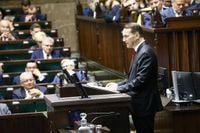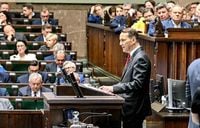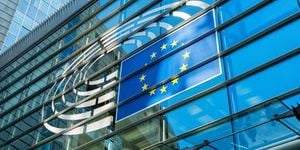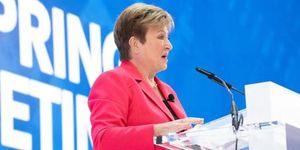In a significant address on April 23, 2025, Polish Foreign Minister Radosław Sikorski outlined the priorities of Poland's foreign policy amidst a tumultuous global landscape. His speech, delivered to the High Chamber, marked his ninth such presentation, reflecting on the thousandth anniversary of the coronation of Bolesław Chrobry, a pivotal moment symbolizing Poland's emergence as a sovereign entity on the international stage.
Sikorski emphasized the necessity of a cohesive foreign policy that transcends political divisions, stating, "Effective foreign policy requires looking beyond divisions and thinking in terms of national interest, not short-term political interests." This call for unity comes at a time when the international environment is increasingly unpredictable, characterized by ongoing conflicts and shifting power dynamics.
Highlighting the ongoing war in Ukraine, Sikorski noted that Russian forces currently control only about 20 percent of Ukrainian territory, with the conflict having cost Russia an estimated $200 billion and nearly a million soldiers eliminated from the battlefield. "Ukrainians have heroically defended their nation, and there is no reason for capitulation," he stated, reiterating Poland's commitment to supporting Ukraine through military and humanitarian aid.
Poland has provided 45 aid packages to Ukraine, valued at approximately €4 billion, and is preparing to deliver the 46th package. Sikorski pointed out that Poland is a leader among NATO members in defense spending, allocating nearly 5 percent of its GDP to military expenditures, which amounts to a defense budget nearing $50 billion.
In discussing Poland's role within NATO and the European Union, Sikorski asserted that membership in these organizations does not compromise Polish sovereignty but rather fortifies it. He stated, "The current potential of all NATO member states, counted in funds spent on defense, is close to $1.5 trillion, while Russia's defense budget is only $145 billion." This stark contrast underscores the strength of NATO as an alliance.
Reflecting on his personal experiences in Ukraine, Sikorski recounted delivering off-road vehicles to front-line units between February 2022 and October 2023. He expressed admiration for the resilience of the Ukrainian people, stating, "Those who think strategically will not be defeated easily." He also emphasized the importance of maintaining transatlantic unity and cooperation, particularly with the United States.
The foreign minister articulated Poland's four main foreign policy objectives: strengthening defense capabilities across Europe, maintaining transatlantic unity, defending the global order based on respect for the UN Charter, and engaging constructively with countries in the Global South. Sikorski noted that Poland's foreign policy aims not to incite disputes but to offer realistic solutions.
Moreover, Sikorski addressed the issue of illegal migration, which he described as part of a hybrid war waged by Russia and Belarus against the West. He announced the suspension of the Poland Business Harbor program aimed at facilitating the entry of IT workers from Belarus and other countries, emphasizing the need for a migration policy that strengthens Poland's economy and social cohesion.
In a pointed critique of Russia, Sikorski referenced Kremlin ideologue Aleksander Dugin's assertion that Poland has no place in Eurasia. He countered, stating, "For those who think they can rewrite history, let me remind you: the first mention of Moscow appeared in 1147 as a provincial settlement of Kievan Rus." This historical perspective underscores Poland's determination to assert its sovereignty and territorial integrity.
As the speech progressed, Sikorski reiterated that the outcome of the war in Ukraine would significantly influence regional security for years to come, determining whether Belarus would succumb to Russian influence or maintain its independence. He called for continued political, military, and financial support for Ukraine from the European Union.
In response to the challenges posed by Russia and its allies, Sikorski highlighted the importance of sanctions, noting that the EU has adopted multiple packages targeting Russian aggression. He stated, "Sanctions weaken the Russian war machine, and their effectiveness is evident in the Kremlin's calls for their removal." He also emphasized that Russia must bear legal and financial responsibility for its actions in Ukraine, particularly concerning war crimes.
On the topic of Poland's relationships with other nations, Sikorski expressed a desire for constructive engagement with the Global South, recognizing the growing influence of these regions in international affairs. He asserted that Poland should actively participate in shaping a stable international order, advocating for partnerships rather than hierarchies.
In conclusion, Sikorski's address underscored the critical need for a united and proactive Polish foreign policy that prioritizes national interests while fostering cooperation with allies. As Europe faces existential challenges, the call for unity and strategic thinking resonates deeply, reminding all that the strength of Poland lies in its ability to navigate complexities with resolve and purpose.
![Radosław Sikorski pilnie wyjechał z Sejmu. Po powrocie ujawnił powód [RELACJA NA ŻYWO]](https://thumbor.evrimagaci.org/KHSGKjKICBnFjg_ZbzJTZZd_8zs=/200x0/tpg%2Fsources%2F85a7de11-568c-41b8-8ec3-6b899f0976ba.jpeg)
![Gorąco w Sejmie. Sikorski w ogniu pytań [RELACJA NA ŻYWO]](https://thumbor.evrimagaci.org/bY5VG21egu-W9b_nq1svwZYO4sc=/200x0/tpg%2Fsources%2Ff5ee60b5-752b-4711-b552-47143546f906.jpeg)





